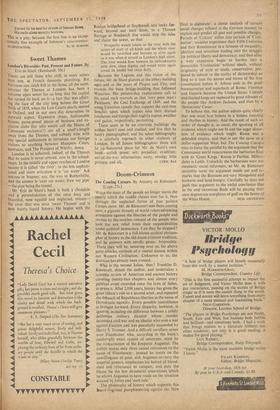Doom-Crimson
WI-u.:tv the mass of the people no longer wants the liberty which the middle classes won for it, then through the neglected forms of free politics Caesars come. Mr. de Riencourt sees them coming now, a gigantic dynasty of world rulers advancing irresistible against the liberties of the people and invited by the reckless consent of the people who look for any relief from their responsibilities under political democracy. Can they be stopped? Mr. de Riencourt is a full-blown cyclical philoso- pher of history in the old doom-crimson tradition, and he answers with terrific gusto: Impossible. 'There they will be, towering over us, far above petty attacks, symbols of a mortal disease within our Western Civilisation.' Unknown to us, the Rubicon has already been crossed.
Who is the second Julius, then? Franklin D. Roosevelt, shouts the author, and undertakes a synoptic review of American and ancient history covering twenty-two chapters and almost every political event recorded since the laws of Solon, to prove it. After 2,000 years, history has given the great villain's role to a second actor, and repeated the debauch of Republican liberties in the name of Democratic equality. Every possible resemblance is brought forward. Every disparity, however, is ignored, including the difference between a coldly deliberate military dictator whose murder detonated civil war and an idealist who won a war against Fascism and was peacefully succeeded by Harry S. Truman. And a difficult corollary arises over Eisenhower who, according to the book's meditevally exact system of antetypes, must be the reincarnation of the Emperor Augustus. The author makes only three casual references to the name of Eisenhower : instead he insists on the unwillingness of poor, sick Augustus to carry the imperial powers, emphasises his hatred of blood- shed and reluctance to conquer, and puts the blame for the few dictatorial innovations which he allows Augustus to have made on the situation created by Julius and 'mob rule.'
The philosophy of history which supports this laurel-disguised pamphleteering against the New
Deal is elaborate: a clever analysis of certain social changes inflated in the German manner to explain and predict all past and possible changes. Periods of 'Culture' stiffen into periods of 'Civil- isation'; societies experience their Fifth Centuries and their Renaissance in a ferment of inequality_ idealism and invention leading into the struggle for political liberty and democracy, and then after a wide expansion begin to harden into a materialist 'Civilisation' without ideals, without originality of style or study, conservative, pre- pared to submit to the reality of dictatorship as long as it uses the names and forms of the free constitution before it. Athens ends in the great bureaucracies and aqueducts of Rome. Florence and Geneva become the United States. Consuls and limited kings are replaced by great tribunes of the people like Andrew Jackson, and then by a 'democratic' Caesar.
To believe this, the author admits quite clearly that one must first believe in a hidden meaning and rhythm in history. And the result of such an order of thought is, as usual, the ignoring of all evidence which might not fit and the eager distor- tion of evidence which might. Rome was a defended empire, and that is not the same as a dollar-supported West, but The Cowing Caesars tries to force the parallel by the argument that the Communist world reincarnates the barbarian East with its 'Great Kings.' Russia is Parthia. Mithri- dates is Lenin. Unluckily the barbarians were not messianic social reformers, so Mr. de Riencourt smoothly turns the argument inside out and re- marks that the Russians are very Mongoloid and barbaric and land-hungry. Carefully he does not push this argument to the awful conclusion that in the end victorious Reds will be playing their own degenerate morphism of golf on the lawns of


































 Previous page
Previous page